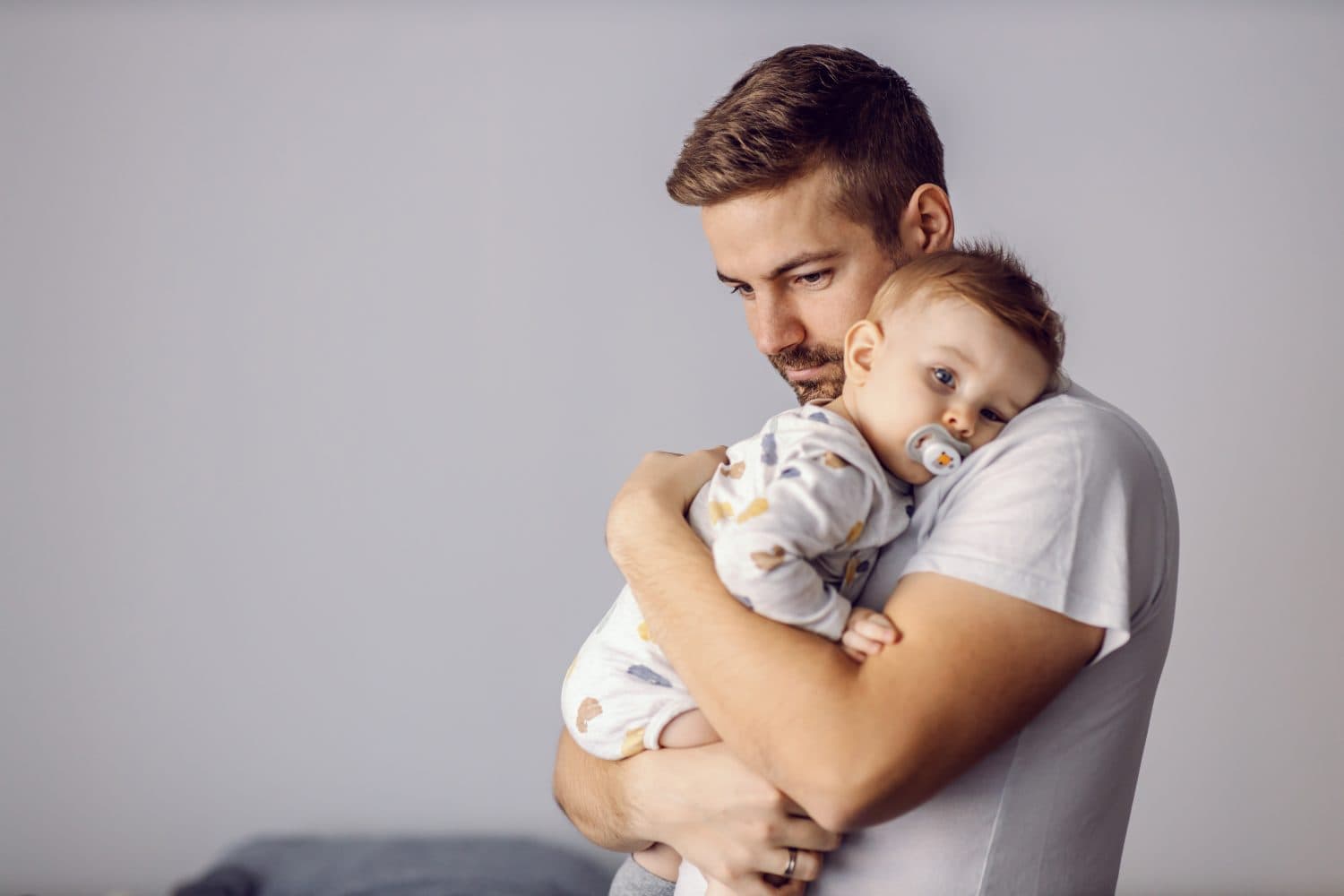Although society has come a long way in terms of talking about mental health, there is one topic that is still somewhat taboo: paternal postpartum depression. (Yes, it's a real thing.) For some men, it goes far beyond “dad stress” that might be attributed to financial worries or even just becoming a father. Male postpartum depression can be just as detrimental to the family unit as maternal postpartum depression. Thankfully, there are ways to identify and treat this mental health issue so that dads can enjoy this new phase in their lives.
Maternal postpartum depression affects 10-15% of women worldwide, according to the Centers for Disease Control and Prevention. Sadly, the dads aren’t too far behind: The National Institutes of Health (NIH) reports that approximately 8-10% of new fathers experience PPD, too. “Paternal Postpartum Depression (PPPD) is a serious but often overlooked mental health condition,” says Dr. Michael G. Wetter, Psy.D., FAPA, a Diplomate and Fellow of the American Psychotherapy Association.
“Some studies even suggest that the number of men suffering from PPPD could be much higher.” Why? Well, some men might be reluctant to admit that they’re struggling with these unfamiliar emotions. Add to that the outdated ideas of what masculinity means, and it’s no wonder that the mental health of some dads declines after their babies are born.

©Prostock-studio/Shutterstock.com
How Is Paternal Postpartum Depression Similar To Maternal PPD?
If you thought that male postpartum depression isn’t as serious as its female counterpart, think again. “PPPD is a real, diagnosable condition with real consequences—not only for the father, but for the baby’s development and the entire family unit,” warns Wetter. Both maternal and paternal PPD involve emotional disturbances such as mood swings, crankiness, and irritability. There's also a marked decline in overall functioning (read: less interest in daily activities, self-isolation, and a reduction in self-care).
What Are The Signs Of Postpartum Depression In Dads?
While maternal postpartum depression comes on quickly (often within the first six weeks after giving birth), paternal postpartum depression kind of creeps up on dads. “The onset for paternal PPD is more gradual,” explains Dr. David Tzall, Psy.D., a licensed psychologist. “It usually peaks around the 3–6-month mark.” That’s one of the main reasons why paternal PPD often goes undetected, according to Tzall, who adds, “It can escalate silently, making it often underreported.”
Typically, maternal PPD is accompanied by sadness, crying spells, and guilt over conflicting feelings towards their baby. Men, on the other hand, are more likely to be angry, irritable, and withdraw completely from both their partner and newborn. “New moms might feel detached or be fearful of harming their baby,” explains Tzall. “New dads may avoid the baby altogether or use work as an escape.”
Sadly, the signs don’t stop there. It’s often a bad joke that men will sleep soundly through the night while their baby is screaming at 3:00 a.m., but that’s not necessarily true for men suffering from PPPD. “Men might have fatigue or sleep disturbances that are unrelated to the baby’s schedule,” adds Wetter. Feelings of inadequacy can also lead to appetite changes that they didn't have before their baby's birth. “Men might turn to alcohol, drugs, or other unhealthy coping mechanisms,” adds Tzall.
What Are The Causes of Male PPD?
It’s undeniable that a brand-new baby brings a lot of joy—and if we’re being honest here—a ton of stress, too. But there are a host of factors that might make some men more prone to PPPD. “Contributors to paternal PPD include hormonal shifts—yes, fathers experience hormonal changes,” explains Wetter. “Financial stress, lack of sleep, previous mental health issues, strained relationships, or feeling excluded from the bonding process all play a part as well.” Plus, having a partner with maternal PPD significantly increases the father’s risk of developing symptoms.

©Prostock-studio/Shutterstock.com
What Are The Treatment Options For Male PPD?
Thankfully, there are ways to ease the effects of male postpartum depression. Wetter says, “Treatment for PPPD typically includes psychotherapy (individual or couples counseling), support groups, and, when needed, medication.” Cognitive Behavioral Therapy (CBT) can be especially effective in helping men access —and express—their emotions. Researchers also suggest that when employers offer paid paternity leave, it can help alleviate financial woes.
Dads who are dealing with depression should also make an effort to include self-care into their routine, even if it means a 10-minute walk. Self-care is also critical in helping mitigate the symptoms associated with PPPD.
That said, one of the best ways to address PPPD is just that—addressing the issue openly and honestly. “Normalizing these experiences and creating space for open dialogue within the relationship or community can reduce stigma and promote early intervention,” says Wetter. That way, dads know that what they’re feeling is very real and that they can get the support that they need—and deserve.
The image featured at the top of this post is ©Dusan Petkovic/Shutterstock.com
